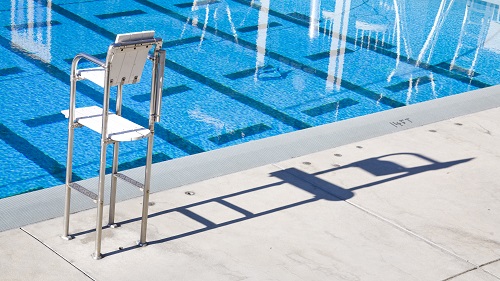

High school and college students are thinking more about spring break than summer vacation but that has not stopped municipalities and aquatics facilities from worrying whether the Great Lifeguard Shortage of 2021 will repeat itself this year. Nationwide, recruitment efforts are being launched with one goal: keep pools open and swim meets running.
Associated Press reported that in Lawrence, Kansas, officials have mounted an all-out campaign to hire more lifeguards. Marketing started a month earlier than usual and pay has increased as well.
The Lawrence Journal-World told reporters that Aquatics Supervisor Lori Madaus said the city was only able to fill 60 of the 100 lifeguard positions it needed last year to have the two city pools fully operational. The Outdoor Aquatic Center opened a couple of weeks later than usual last year, with reduced hours and features, and the Indoor Aquatic Center continues to have reduced hours and the children’s swim area remains closed.
In Phoenix, Arizona, officials need more than 400 lifeguards in order to open (and keep open) the area’s pools this summer, noted Athletic Business.
“If we cannot hire the number of lifeguards we need, we cannot open all 29 pools and that means less people will have access to a pool where they can cool off and less children will learn to swim,” aquatics director Becky Hulett told the local ABC affiliate. “Being a lifeguard is the best summer job. You’re taught valuable life skills and meet friends that will last a lifetime.”
Philadelphia is another major city waging war against the guard shortage, says Why.org. Recruitment is on, following a challenging 2021 summer season, which saw fewer than 70 percent of the city’s roughly 70 outdoor pools open due to a lifeguard shortage.
Another challenge for cities who want to attract guards is trying to match, or outmatch, the hourly rates offered by private swim clubs and water parks. Additionally, states have varying regulations in terms of whether lifeguards are required in pools on the property of apartment or condominium complexes, and those regulations create even more of a demand for lifeguards.
But there is another trend at work. As society becomes increasingly litigious and insurance rates trend up, some of those condo and apartment complexes are opting to demolish swimming pools and replace them with amenities like dog parks, playgrounds and spots where residents can gather for picnicking. Initially, this might be seen as a way of creating less of a drain on the lifeguard (heh) pool but the long-term view is much more bleak. When pools go by the wayside, so do opportunities. Local swim meets and leagues have become the feeder systems for high school and college swimmers (and ultimately, elite programs). And if, once again, a shortage lifeguards limits the operation hours or even keeps pools closed, the likelihood that operators will have enough lifeguards to work competitive events could be slim — especially since many lifeguards already might be participating in those events themselves.
To be eligible to work as a lifeguard, students need to be at least 15 years old and pass all appropriate certification courses.
One of the interesting twists that came about last summer as a result of the guard shortage was that of out-of-work adults renewing their certifications and climbing back into lifeguard stands nationwide. Ironically, that trend mirrored something long complained about by real-life lifeguards: people who watched the old TV show, Baywatch, had the mistaken impression that guards were all thirtysomething (and sometimes fortysomething) adults, when in reality, they were largely teenagers and college students. Having roles played by actors like David Hasselfoff, Alexandra Paul, Pamela Anderson – and in 2017, when the movie came out, Dwayne Johnson and Zac Efron – made the general public believe guarding was a true career path. And since a sequel to the movie is reportedly in the works, it’s a phenom we might see again.
Another problem contributing to the guard shortage has been pandemic-caused restrictions to the nation’s J1-visa program, which brings international workers to the United State to fill gaps in labor pools. The program was halted in 2019, and the pandemic brought even more complications regarding international travel. The fact that many guards came from Ukraine could also prove problematic. SDM will continue to follow this developing issue.

